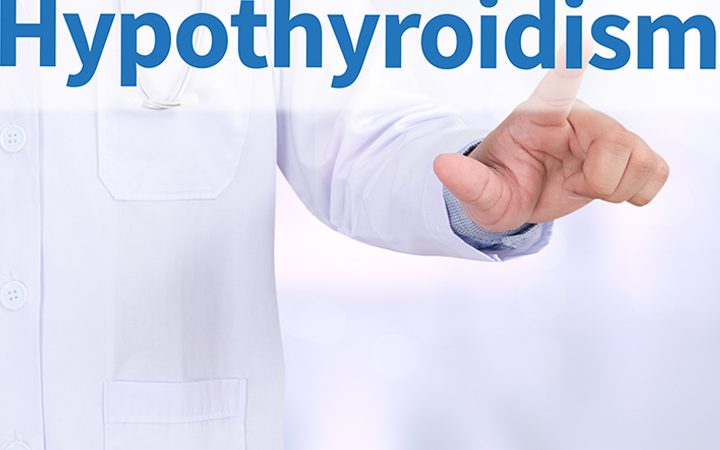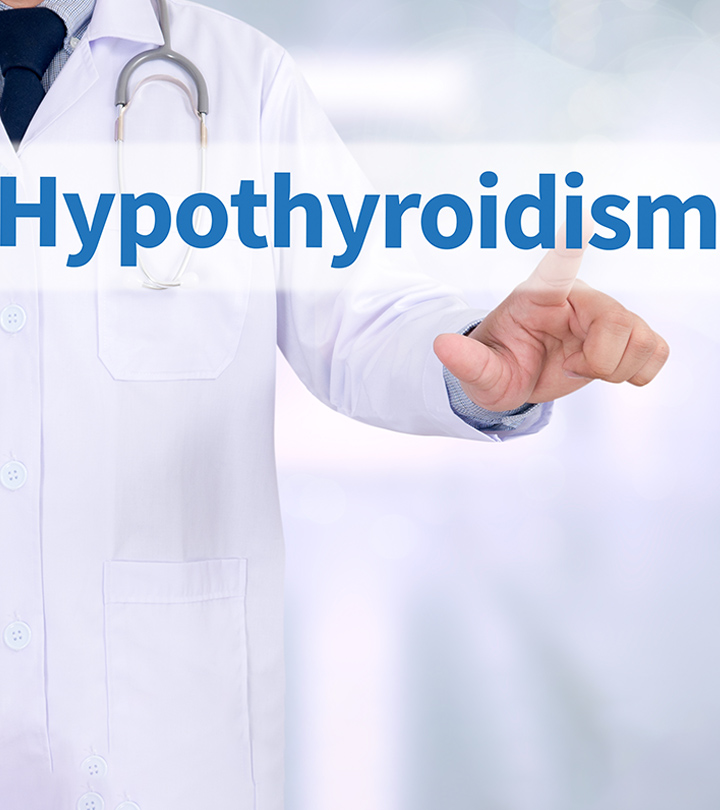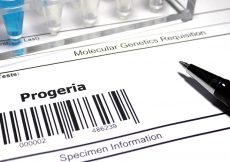Congenital hypothyroidism is an endocrine disorder wherein the baby’s thyroid gland does not produce thyroid hormones or makes very little of them. The baby has an under-functioning thyroid gland at birth, hence the term, congenital. The condition is also called neonatal hypothyroidism.
Newborns are routinely screened for the disorder before being discharged from the hospital. Timely diagnosis and treatment with appropriate medication could help in a favorable prognosis. Read on to learn about the causes, signs, diagnosis, and treatment for congenital hypothyroidism in babies.
Signs And Symptoms Of Congenital Hypothyroidism
The signs and symptoms of congenital hypothyroidism may vary based on the severity of the disorder. Many newborns may not show any signs initially. The signs and symptoms may emerge a few days after birth, depending on the extent of problems with the thyroid gland (1).
The common signs and symptoms of the disorder could include the following (2).
- Puffiness of the face
- Abdominal distention
- Thick or abnormally large tongue (Macroglossia)
- Constipation
- Feeding difficulties
- Large posterior fontanel or soft spot
- Weak muscle tone (Hypotonia)
- Sleep problems, such as difficulty falling asleep
- Protrusion of the belly button (Umbilical hernia)
Babies with mild hypothyroidism may not show any symptoms. However, severe congenital hypothyroidism may cause the following serious signs and symptoms.
- Yellowing of the skin and eyes (Jaundice)
- Lethargy and drowsiness
- Dry skin
- Poor or hoarse cry
- Abnormally low hairline
- Brittle hair
- Short height
- Flat nose
- Puffy or abnormally shaped eyelids
- Clouding of the eye’s lens (Cataract)
- Low body temperature
- Abnormal heart rate
- Low blood pressure
What Causes Congenital Hypothyroidism?
Congenital hypothyroidism mostly occurs due to failed formation of the baby’s thyroid gland before birth (3). Some babies have an abnormally small thyroid gland (hypoplastic thyroid gland), while the rest have the gland located at an abnormal location. Nearly 80-85% of cases of congenital hypothyroidism occur due to absent, hypoplastic, or abnormally located thyroid gland (4). These causes are all collectively called thyroid dysgenesis.
In less common cases, the gland could be normal or abnormally large (goiter) but may not produce adequate thyroid hormones. Such cases occur due to problems in steps of hormone synthesis. Such causes are considered thyroid dyshormonogenesis.
In rare cases, the disorder may occur not due to a problem in the thyroid gland, rather due to inadequate stimulation from the pituitary gland. The pituitary gland does not make sufficient thyroid-stimulating hormone (TSH), leading to inadequate secretion of thyroid hormones by the thyroid gland (5). Since the cause is related to the central nervous system, it is called central hypothyroidism.
The following conditions or factors may lead to thyroid dysgenesis, thyroid dyshormonogenesis, or central hypothyroidism.
- Maternal iodine deficiency during pregnancy
- Maternal medications during pregnancy
- Maternal antibodies that affect the function of the fetus’ thyroid gland
- Genetic mutations
Maternal iodine deficiency may most commonly cause thyroid dysgenesis, while genetic mutations account for 2-5% of cases. Genetic mutations may mostly be responsible for thyroid dyshormonogenesis and central hypothyroidism, which account for 15-20% of cases. There may be several cases where the cause may be unknown.
Risk Factors For Congenital Hypothyroidism
Babies with the following conditions may have a higher risk of developing congenital hypothyroidism (3).
- Genetic syndromes, such as Down syndrome, Turner syndrome, and Williams syndrome
- Autoimmune disorders, such as type 1 diabetes and celiac disease
In very rare cases, severe delivery-related injuries to the baby’s thyroid gland may increase the risk of hypothyroidism.
Genetic syndromes may usually lead to thyroid dyshormonogenesis and central hypothyroidism. Most cases of congenital hypothyroidism are not associated with family history, and only a few cases occur due to inherited genetic mutations.
How Common Is Congenital Hypothyroidism?
The disorder affects one in 2,000 to 4,000 newborns (4). Most babies are affected by the thyroid dysgenesis type of neonatal hypothyroidism. Thyroid dysgenesis affects girls more than boys for unknown reasons. Thyroid dyshormonogenesis and central hypothyroidism affect boys and girls equally.
How Is Congenital Hypothyroidism Diagnosed?
All newborns are screened for thyroid function through a heel-prick test (blood collected from the heel) before being discharged from the hospital or five days after birth. The test is mandatory in several countries, such as the United States and the United Kingdom (6).
Some babies may not be screened or develop symptoms of the disorder later. The following tests could be done to determine the presence of congenital hypothyroidism (5).
1. Physical examination: The doctor will check for physical signs, such as poor muscle tone and large posterior fontanel, which may suggest an underlying issue. Babies with other genetic disorders, such as Down syndrome, may already be assessed for other illnesses, including congenital hypothyroidism.
2. Thyroid function test: A small amount of blood from the baby’s heel is collected. The blood is assessed for levels of thyroxine hormone (T4) and thyroid-stimulating hormone (TSH). The baby is considered to have hypothyroidism if the TSH levels exceed the normal range and the T4 levels are below the normal range.
3. Thyroid ultrasound scan: The scan is suggested if the thyroid function test indicates possible hypothyroidism. An ultrasound probe is used to scan the thyroid gland in the neck. The test could assess any abnormalities in the gland’s shape or location. It could help the doctor determine the underlying reason behind the irregular thyroid function test results.
Some babies may need to undergo an X-ray of various bones to confirm the diagnosis further. Most babies with the condition are usually diagnosed within the first two weeks of life.
How Is Congenital Hypothyroidism Treated?
Babies diagnosed with congenital hypothyroidism are referred to a pediatric endocrinologist. The treatment is initiated immediately with the oral administration of levothyroxine, which is the synthetic form of the thyroxine (T4) hormone.
The following are the key attributes of treatment with levothyroxine (7).
- The drug is available as tablets or liquid. The tablet must be crushed and dissolved in clean drinking water, breast milk, or formula. It should be administered through a clean infant feeding syringe or a dropper.
- The tablets or liquid are available in varying strengths or concentrations. Make sure you double-check before you make a purchase.
- Levothyroxine should only be administered in the exact dose at the exact time. Learn from your doctor beforehand about what you should do in case you miss the dose.
- Levothyroxine works as a replacement for the missing thyroxine hormone. Therefore, the drug seldom causes side effects when administered in the correct dose. Excess supplementation or overdose may lead to side effects, such as hyperthyroidism. However, it can be avoided by sticking to the time and dosage mentioned in the prescription.
- Babies will need to undergo periodic blood tests to assess T4 levels and to check the progress of treatment.
- Once your baby is older, you may serve the medicine dissolved in water served in a sippy cup.
The treatment’s duration may vary depending on the underlying cause of hypothyroidism. Babies with a missing thyroid gland or genetic syndrome may need synthetic thyroxine for the rest of their lives (8). Some babies with transient congenital hypothyroidism due to maternal medications during gestation may stop having levothyroxine once their thyroid gland produces adequate T4 hormone.
What Is The Prognosis Of Congenital Hypothyroidism?
The long-term outlook of congenital hypothyroidism is good for most babies who receive early treatment. Babies with thyroid dysgenesis could face no problems in childhood thanks to levothyroxine treatment. Hypothyroidism due to genetic mutations or syndromes may cause other problems. In such cases, the child may require additional medications and supportive care to minimize any day-to-day challenges.
Can Congenital Hypothyroidism Be Prevented?
There is no definitive way of preventing congenital hypothyroidism in newborns. Mothers may reduce the risk of the disorder during pregnancy through the following ways (9).
- Eat a well-balanced diet with adequate iodine. You can easily consume iodine by adding iodized salt to your diet without the need for supplements.
- If you are pregnant or planning to conceive, let your doctor know before they prescribe any medication. The doctor could change the medicine to make it safe for the developing fetus.
- If you have a thyroid-related problem during pregnancy, do let the doctor know. Several medicines prescribed for thyroid-related ailments may affect the fetus’ thyroid gland growth. Your pregnancy may have to be monitored closely in such cases.
- If you have a family history of genetic syndromes, speak to a genetic counselor to learn about any associated problems, such as congenital hypothyroidism. It could help you be better prepared with diagnostic procedures once the baby is born.
Congenital hypothyroidism could occur in infants due to various reasons. Most cases are usually diagnosed in early infancy because newborn screening tests are already mandated by law in many countries. Some babies may display symptoms days after birth. If you notice potential symptoms or your baby has poor feeding skills and appears floppy, do not hesitate to consult a pediatrician.
References:
MomJunction’s articles are written after analyzing the research works of expert authors and institutions. Our references consist of resources established by authorities in their respective fields. You can learn more about the authenticity of the information we present in our editorial policy.
The following two tabs change content below.




































